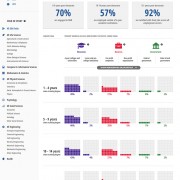Science Doctorates Find Success in Wide Range of Job Sectors

Richard Fienberg AAS Solar Eclipse Task Force
This post is adapted from a National Science Foundation press release:
With the release of a new Policy Brief featuring an interactive infographic, the National Science Board (NSB) provides a powerful new tool for policymakers, educators, business leaders, students, and others to assess the career opportunities for those with doctoral degrees in science, engineering, and health (SEH) fields.
"We need to exorcise the notion that those who get a PhD in a science, engineering, or health field are limited to an academic career," said Geraldine Richmond, chair of the NSB's National Science and Engineering Policy Committee and lead in developing the Brief. "The data show incredibly diverse jobs that PhD holders are in across all employment sectors. It's our hope that this brief helps raise awareness in students and faculty about the rich and varied career paths that these doctorates can take."
The infographic takes a deeper look at a key issue the NSB raised two years ago when it released its report, Revisiting the STEM Workforce. That report highlighted the need for a STEM-capable workforce in today's knowledge economy. It also showed that a degree in science and engineering can be a "passport" to a wide range of professions and that over half of these degree holders work in non-STEM jobs.
Using data from the Survey of Doctorate Recipients (SDR), NSB's infographic lets users explore where doctorates in 26 SEH fields are employed across job sectors in education, business, and government, and to see how that changes with time. Users can also look at demographics, including gender, race, and ethnicity; and at characteristics such as job duties and job satisfaction. Data can be downloaded and the visualizations exported.
Key findings include these:
- More than 50% of SEH doctorates are employed in professions outside of academia within 10-14 years of graduating. This has been the case for more than 20 years.
- More than 90% of respondents report job satisfaction 15+ years after getting their doctorate.
- Employment sectors into which individuals go early and mid-career varies by field of degree. For example, the career pathways of social scientists are very different from those of engineers.
- The majority of recent doctoral graduates engage in research and development, regardless of employment sector.
- As their career progresses, PhD holders engage in other activities such as management.
View the infographic, "SEH Doctorates in the Workforce, 1993-2013"


